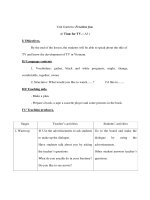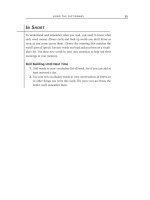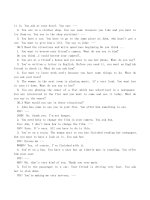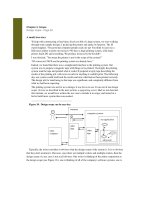Gre vocabulary list phần 3 potx
Bạn đang xem bản rút gọn của tài liệu. Xem và tải ngay bản đầy đủ của tài liệu tại đây (97.55 KB, 17 trang )
Tài liệu TOEFL, GRE, GMAT miễn phí tại: www.dethi.net Học bổng www.hocbong.org
comport
(v.) fitting in
It was easy to comport to the new group of employees.
comprehensive
(adj.) all-inclusive; complete; thorough
It's the only health facility around to offer comprehensive care.
compromise
(v.) to settle by mutual adjustment
Labor leaders and the automakers compromised by agreeing to a starting
wage of $16 an hour in exchange for concessions on health-care
premiums.
concede
(v.) to acknowledge; admit; to surrender; to abandon one's position
After much wrangling, the conceded that the minister had a point.
Satisfied with the recount, the mayor conceded graciously.
conceit
(n.) an exaggerated personal opinion
The man's belief that he was the best player on the team was pure
conceit.
conciliation
(n.) an attempt to make friendly or placate
The attempt at conciliation
conciliatory
(adj.) to reconcile
The diplomat sought to take a conciliatory approach to keep the talks
going.
concise
(adj.) in few words; brief; condensed
The concise instructions were printed on two pages rather than the
customary five.
Tài liệu TOEFL, GRE, GMAT miễn phí tại: www.dethi.net Học bổng www.hocbong.org
conclave
(n.) any private meeting or closed assembly
The conclave was to meet in the executive suite.
condescend
(v.) to come down from one's position or dignity
The arrogant, rich man was usually condescending towards his servants.
condone
(v.) to overlook; to forgive
The loving and forgiving mother condoned her son's life of crime
I will condone your actions of negligence.
confluence
(n.) a thing which is joined together
Great cities often lie at the confluence of great rivers.
confound
(v.) to lump together, causing confusion; to damn
The problem confounded our ability to solve it.
Confound you, you scoundrel!
conglomeration
(n.) a collection or mixture of various things
The conglomeration is made up of four different interest groups.
The soup was a conglomeration of meats and vegetables.
conjoin
(v.) to combine
The classes will conjoin to do the play.
conjure
(v.) to call upon or appeal to; to cause to be, appear, come
The smell of the dinner conjured images of childhood.
The magician conjured a rabbit out of a hat.
connivance
(n.) secret cooperation in wrongdoing
With the guard's connivance, the convict was able to make his escape.
Tài liệu TOEFL, GRE, GMAT miễn phí tại: www.dethi.net Học bổng www.hocbong.org
connoisseur
(n.) expert; authority (usually refers to a wine or food expert)
They allowed her to choose the wine for dinner since she was the
connoisseur.
connotative
(adj.) containing associated meanings in addition to the primary one
Along with the primary meaning of the word, there were two connotative
meanings.
The connotative meaning of their music was spelled out in the video.
consecrate
(v.) to declare sacred; to dedicate
We will consecrate the pact during the ceremony.
The park was consecrated to the memory of the missing soldier.
consequential
(adj.) following as an effect; important
His long illness and consequential absence set him behind in his
homework.
The decision to move the company will be consequential to its success.
consort
(n.; v.) a companion, spouse; to associate
An elderly woman was seeking a consort.
They waited until dark to consort under the moonlight.
conspicuous
(adj.) easy to see; noticeable
The diligent and hardworking editor thought the obvious mistake was
conspicuous.
consternation
(n.) amazement or terror that causes confusion
The look of consternation on the child's face caused her father to
panic.
constrain
(v.) to force, compel; to restrain
Tài liệu TOEFL, GRE, GMAT miễn phí tại: www.dethi.net Học bổng www.hocbong.org
It may be necessary to constrain the wild animal if it approaches the
town.
The student was constrained to remain in her seat until the teacher
gave her permission to leave.
consummation
(n.) the completion; finish
Following the consummation of final exams, most of the students
graduated.
contemporary
(adj.) living or happening at the same time; modern
Contemporary furniture will clash with your traditional sectional.
contempt
(n.) scorn; disrespect
The greedy, selfish banker was often discussed with great contempt.
contentious
(adj.) quarrelsome
The contentious student was asked to leave the classroom.
They hate his contentious behavior because every suggestion they give
ends in a fight.
contest
(v.) to attempt to disprove or invalidate
I will attempt to contest the criminal charges against me.
contiguous
(adj.) touching; or adjoining and close, but not touching
There are many contiguous buildings in the city because there is no
excess land to allow space between them.
contravene
(v.) to act contrary to; to oppose or contradict
The story of the accused contravened the story of the witness.
The United Nations held that the Eastern European nation had
contravened the treaty.
Tài liệu TOEFL, GRE, GMAT miễn phí tại: www.dethi.net Học bổng www.hocbong.org
contrite
(adj.) regretful; sorrowful; having repentance
Regretting his decision not to attend college, the contrite man did
not lead a very happy life.
A contrite heart has fixed its wrongs.
contumacious
(adj.) resisting authority
The man was put in jail for contumacious actions.
contusion
(n.) a bruise; an injury where the skin is not broken
The man was fortunate to receive only contusions from the crash.
conundrum
(n.) a puzzle or riddle
I spent two hours trying to figure out the conundrum.
The legend says that to enter the secret passageway, one must answer
the ancient conundrum.
conventional
(adj.) traditional; common; routine
The bride wanted a conventional wedding ceremony, complete with white
dresses, many flowers, and a grand reception party.
Conventional telephones are giving way to videophones.
converge
(v.) to move toward one point (opposite: diverge)
It was obvious that an accident was going to occur as the onlookers
watched the two cars converge.
The two roads converge at the corner.
conviviality
(n.) a fondness for festiveness or joviality
His conviviality makes him a welcome guest at any social gathering.
convoke
(v.) a call to assemble
Tài liệu TOEFL, GRE, GMAT miễn phí tại: www.dethi.net Học bổng www.hocbong.org
The teacher convoked her students in the auditorium to help prepare
them for the play.
copious
(adj.) abundant; in great quantities
Her copious notes touched on every subject presented in the lecture.
corpulence
(n.) obesity
The corpulence of the man kept him from fitting into the seat.
correlate
(v.) to bring into mutual relation
The service man was asked to correlate the two computer demonstration
pamphlets.
corroborate
(v.) to confirm the validity
The witness must corroborate the prisoner's story if she is to be set
free.
coterie
(n.) a clique; a group who meet frequently, usually socially
A special aspect of campus life is joining a coterie.
Every day after school she joins her coterie on the playground and
they go out for a soda.
covenant
(n.) a binding and solemn agreement
With the exchange of vows, the covenant was complete.
covetous
(adj.) greedy; very desirous
Lonnie, covetous of education, went to almost every lecture at the
university.
Covetous of her neighbor's pool, she did everything she could to make
things unpleasant
cower
(v.) to huddle and tremble
Tài liệu TOEFL, GRE, GMAT miễn phí tại: www.dethi.net Học bổng www.hocbong.org
The lost dog cowered near the tree.
The tellers cowered in the corner as the bandit ransacked the bank.
coy
(adj.) modest; bashful; pretending shyness to attract
Her coy manners attracted the man.
He's not really that shy, he's just being coy.
crass
(adj.) stupid or dull; insensitive; materialistic
To make light of someone's weakness is crass.
They made their money the old-fashioned way, but still they were
accused of being crass.
My respect for the man was lowered when he made the crass remark.
craven
(n.; adj.) coward; abject person; cowardly
While many fought for their rights, the craven sat shaking, off in a
corner somewhere.
Craven men will not stand up for what they believe in.
culpable
(adj.) deserving blame; guilty
The convicted criminal still denies that he is culpable for the
robbery.
curb
(n.) a restraint or framework
A curb was put up along the street to help drainage.
curmudgeon
(n.) an ill-tempered person
The curmudgeon asked the children not to play near the house.
cursory
(adj.) hasty; slight
The detective's cursory examination of the crime scene caused him to
overlook the lesser clues.
Tài liệu TOEFL, GRE, GMAT miễn phí tại: www.dethi.net Học bổng www.hocbong.org
cynic
(n.) one who believes that others are motivated entirely by
selfishness.
The cynic felt that the hero saved the man to become famous.
dais
(n.) a raised platform at one end of a room
The dais was lowered to make the speaker look taller.
dally
(v.) to loiter; to waste time
Please do not dally or we will miss our appointment.
dank
(adj.) damp and chilly
The cellar became very dank during the winter time.
dauntless
(adj.) fearless; not discouraged
The dauntless ranger scaled the mountain to complete the rescue.
dearth
(n.) scarcity; shortage
A series of coincidental resignations left the firm with a dearth of
talent.
The dearth of the coverage forced him to look for a new insurance
agent.
debacle
(n.) disaster; collapse; a rout
The Securities and Exchange Commission and the stock exchanges
implemented numerous safeguards to head off another debacle on Wall
Street.
debase
(v.) to make lower in quality
The French are concerned that "Franglais," a blending of English and
French, will debase their language.
Tài liệu TOEFL, GRE, GMAT miễn phí tại: www.dethi.net Học bổng www.hocbong.org
debauchery
(n.) indulgence in one's appetites
The preacher decried debauchery and urged charity.
debilitate
(v.) to enfeeble; to wear out
The phlebitis debilitated him to the point where he was unable even to
walk.
The illness will debilitate the muscles in his legs.
debonair
(adj.) having an affable manner; carefree; genial
Opening the door for another is a debonair action.
decadence
(n.) a decline in morals or art
Some believe the decadence of Nero's rule led to the fall of the
empire.
deciduous
(adj.) shedding; temporary
When the leaves began to fall from the tree we learned that it was
deciduous.
decisiveness
(n.) an act of being firm or determined
Decisiveness is one of the key qualities of a successful executive.
decorous
(adj.) showing decorum; propriety, good taste
This movie provides decorous refuge from the violence and mayhem that
permeates the latest crop of Hollywood films.
The decorous suit was made of fine material.
decry
(v.) to denounce or condemn openly
The pastor decried all forms of discrimination against any minority
group.
Tài liệu TOEFL, GRE, GMAT miễn phí tại: www.dethi.net Học bổng www.hocbong.org
defamation
(n.) to harm a name or reputation; to slander
The carpenter felt that the notoriousness of his former partner
brought defamation to his construction business.
deference
(n.) a yielding of opinion; courteous respect for
To avoid a confrontation, the man showed deference to his friend.
The deference shown to the elderly woman's opinion was heartwarming.
deferential
(adj.) yielding to the opinion of another
After debating students living in the Sixth Ward for months, the
mayor's deferential statements indicated that he had come to some
understanding with them.
defunct
(adj.) no longer living or existing
The man lost a large sum of money when the company went defunct.
deign
(v.) condescend; stoop
He said he wouldn't deign to dignify her statement with a response.
Fired from his job as a programmer analyst, Joe vowed he would never
deign to mop floors-even if he were down to his last penny.
deleterious
(adj.) harmful; hurtful; noxious
Deleterious fumes escaped from the overturned truck.
deliberate
(v.; adj.) to consider carefully; weigh in the mind; intentional
The jury deliberated for three days before reaching a verdict.
The brother's deliberate attempt to get his sibling blamed for his
mistake was obvious to all.
delineate
(v.) to outline; to describe
Tài liệu TOEFL, GRE, GMAT miễn phí tại: www.dethi.net Học bổng www.hocbong.org
She delineated her plan so that everyone would have a basic
understanding of it.
deliquesce
(v.) to dissolve
The snow deliquesced when the temperature rose.
delusion
(n.) a false belief or opinion
The historian suffered from the delusion that he was Napoleon.
demise
(n.) ceasing to exist as in death
The demise of Gimbels followed years of decline.
demur
(v.; n.) to object; objection; misgiving
She hated animals, so when the subject of buying a cat came up, she
demurred.
She said yes, but he detected a demur in her voice.
She was nominated to sit on the committee, but she demurred.
The council president called for a vote, and hearing no demur, asked
for a count by the clerk.
denigrate
(v.) to defame, to blacken or sully; to belittle
After finding out her evil secret, he announced it to the council and
denigrated her in public.
Her attempt to denigrate the man's name was not successful.
denounce
(v.) to speak out against; condemn
A student rally was called to denounce the use of drugs on campus.
depict
(v.) to portray; describe
The mural depicts the life of a typical urban dweller.
Tài liệu TOEFL, GRE, GMAT miễn phí tại: www.dethi.net Học bổng www.hocbong.org
deplete
(v.) to reduce; to empty, exhaust
Having to pay the entire bill will deplete the family's savings.
deposition
(n.) a removal from office or power; a testimony
Failing to act lawfully could result in his deposition.
She met with her lawyer this morning to review her deposition.
depravity
(n.) moral corruption; badness
Drugs and money caused depravity throughout the once decorous
community.
The depravity of the old man was bound to land him in jail one day.
deprecate
(v.) to express disapproval of; to protest against
The environmentalists deprecated the paper companies for cutting down
ancient forests.
The organization will deprecate the opening of the sewage plant.
depredation
(n.) a plundering or laying waste
The pharaoh's once rich tomb was empty after centuries of depredation
from grave robbers.
deride
(v.) to laugh at with contempt; to mock
No matter what he said, he was derided.
It is impolite to deride someone even if you dislike him.
derision
(n.) the act of mocking; ridicule, mockery
A day of derision from the boss left the employee feeling depressed.
Constant derision from classmates made him quit school.
derisive
(adj.) showing disrespect or scorn for
The derisive comment was aimed at the man's life long enemy.
Tài liệu TOEFL, GRE, GMAT miễn phí tại: www.dethi.net Học bổng www.hocbong.org
derogatory
(adj.) belittling; uncomplimentary
He was upset because his annual review was full of derogatory comments.
descant
(v.) lengthy talking or writing
The man will descant on the subject if you give him too much speaking
time.
desecrate
(v.) to profane; violate the sanctity of
The teenagers' attempt to desecrate the church disturbed the community.
desist
(v.) to stop or cease
The judge ordered the man to desist from calling his ex-wife in the
middle of the night.
desolate
(adj.) to be left alone or made lonely
Driving down the desolate road had Kelvin worried that he wouldn't
reach a gas station in time.
despoil
(v.) to take everything; plunder
The Huns despoiled village after village.
despotism
(n.) tyranny; absolute power or influence
The ruler's despotism went uncontested for 30 years.
destitute
(adj.) poor; poverty-stricken
One Bangladeshi bank makes loans to destitute citizens so that they
may overcome their poverty.
Many of the city's sections are destitute.
desultory
(adj.) moving in a random, directionless manner
Tài liệu TOEFL, GRE, GMAT miễn phí tại: www.dethi.net Học bổng www.hocbong.org
The thefts were occurring in a desultory manner making them difficult
to track.
detached
(adj.) separated; not interested; standing alone
Detached from modern conveniences, the islanders live a simple,
unhurried life.
deter
(v.) to prevent; to discourage; hinder
He deterred the rabbits by putting down garlic around the garden.
determinate
(adj.) distinct limits
The new laws were very determinate as far as what was allowed and what
was not allowed.
devoid
(adj.) lacking; empty
The interplanetary probe indicated that the planet was devoid of any
atmosphere.
dexterous
(adj.) skillful, quick mentally or physically
The dexterous gymnast was the epitome of grace on the balance beam.
diatribe
(n.) a bitter or abusive speech
During the divorce hearings she delivered a diatribe full of the
emotion pushing her away from her husband.
The diatribe was directed towards a disrespectful supervisor.
dichotomy
(n.) a division into two parts or kinds
The dichotomy within the party threatens to split it.
The dichotomy between church and state renders school prayer
unconstitutional.
Tài liệu TOEFL, GRE, GMAT miễn phí tại: www.dethi.net Học bổng www.hocbong.org
dictum
(n.) a formal statement of either fact or opinion
Computer programmers have a dictum: garbage in, garbage out.
didactic
(adj.) instructive; dogmatic; preachy
Our teacher's didactic technique boosted our scores.
The didactic activist was not one to be swayed.
diffidence
(n.) a hesitation in asserting oneself
A shy person may have great diffidence when forced with a problem.
diffident
(adj.) timid; lacking self-confidence
The director is looking for a self-assured actor, not a diffident one.
Her diffident sister couldn't work up the courage to ask for the sale.
diffuse
(adj.) spread out; verbose (wordy); not focused
The toys were discovered in a diffuse manner after the birthday party.
His monologue was so diffuse that all his points were lost.
digress
(v.) stray from the subject; wander from topic
It is important to not digress from the plan of action.
dilettante
(n.) an admirer of the fine arts; a dabbler
Though she played the piano occasionally, she was more of a dilettante.
diligence
(n.) hard work
Anything can be accomplished with diligence and commitment.
diminutive
(adj.; n.) smaller than average; a small person; a word, expressing
smallness, formed when a suffix is added
They lived in a diminutive house.
The diminutive woman could not see over the counter.
Tài liệu TOEFL, GRE, GMAT miễn phí tại: www.dethi.net Học bổng www.hocbong.org
din
(n.) a noise which is loud and continuous
The din of the jackhammers reverberated throughout the concrete canyon.
dint
(n.) strength
The dint of the bridge could hold trucks weighing many tons.
dirge
(n.) a hymn for a funeral; a song or poem expressing lament
The mourners sang a traditional Irish dirge .
disapprobation
(n.) disapproval
Her disapprobation of her daughter's fiancZ' divided the family.
disarray
(n.) (state of) disorder
The thief left the house in disarray.
disavow
(v.) to deny; to refuse to acknowledge
The actor has disavowed the rumor.
discerning
(adj.) distinguishing one thing from another; having good judgment
He has a discerning eye for knowing the original from the copy.
Being discerning about a customer's character is a key qualification
for a loan officer.
discomfit
(v.) to frustrate the expectations of
The close game discomfited the number one player.
discord
(n.) disagreement; lack of harmony
There was discord amidst the jury, and therefore a decision could not
be made.
Tài liệu TOEFL, GRE, GMAT miễn phí tại: www.dethi.net Học bổng www.hocbong.org
discourse
(v.) to converse; to communicate in an orderly fashion
The scientists discoursed on a conference call for just five minutes
but were able to solve three major problems.
The interviewee discoursed so fluently, she was hired on the spot.
discreet
(adj.) showing good judgment in conduct; prudent
We confided our secret in Mary because we knew she'd be discreet.
discrete
(adj.) separate; individually distinct; composed of distinct parts
There were four discrete aspects to the architecture of the home.
The citizens committee maintained that road widening and drainage were
hardly discrete issues.
discriminate
(v.) distinguish; demonstrate bias
Being a chef, he discriminated carefully among ingredients.
Reeling from the fact that senior managers had been caught on tape
making offensive remarks, the CEO said he would not tolerate any of
his firm's employees discriminating against anyone for any reason.
disdain
(n.; v.) intense dislike; look down upon; scorn
She showed great disdain toward anyone who did not agree with her.
She disdains the very ground you walk upon.
disentangle
(v.) to free from confusion
We need to disentangle ourselves from the dizzying variety of choices.
disheartened
(adj.) discouraged; depressed
After failing the exam, the student became disheartened and wondered
if he would ever graduate.
disingenuous
(adj.) not frank or candid; deceivingly simple (opposite: ingenious)









